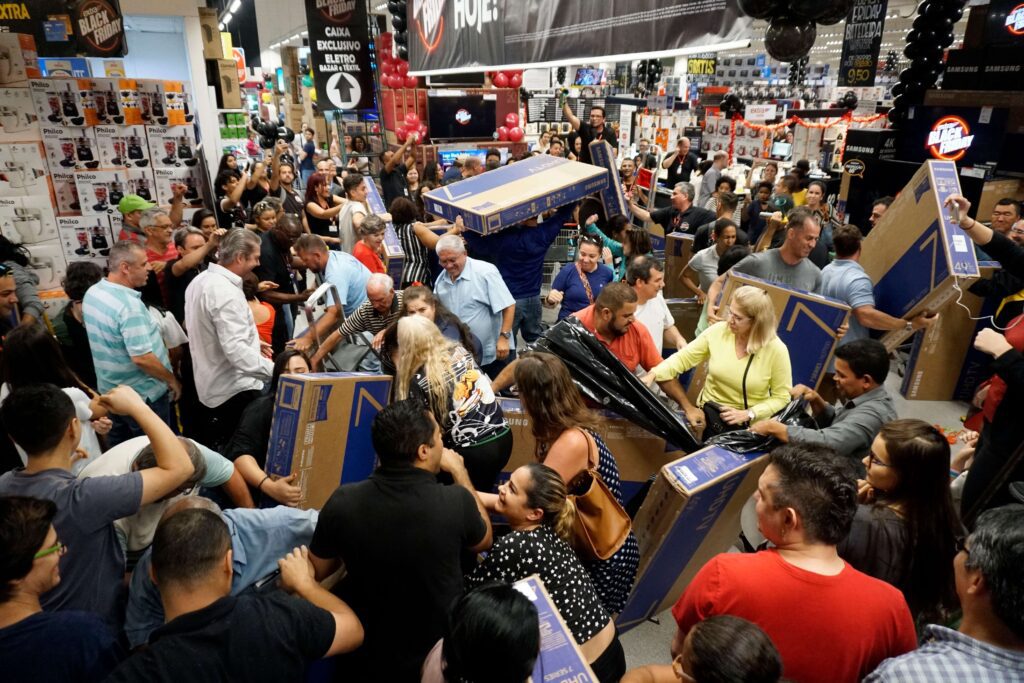The Hidden Costs of Black Friday: Mental Health and Compulsive Shopping
As November rolls in, Black Friday and Cyber Monday dominate the headlines, signaling the start of the holiday shopping season. These two days are synonymous with massive discounts, frantic shopping, and the pursuit of the best deals. However, for many individuals, these shopping holidays can spark emotional and behavioral challenges, especially for those grappling with mental health concerns or recovery from addiction.
At Lifescape Recovery, we understand the complex relationship between external pressures, mental health, and addiction. By exploring the history of these shopping phenomena and their psychological impact, we aim to provide strategies to navigate this season with balance and mindfulness.

The Origins of Black Friday and Cyber Monday
The term “Black Friday” dates back to the 1950s in Philadelphia, where it was used to describe the chaotic traffic and overcrowded sidewalks that followed Thanksgiving. Over time, retailers reclaimed the term, associating it with profitability or being financially successful. By the 1980s, Black Friday had evolved into the unofficial start of the holiday shopping season, marked by doorbuster deals and long lines.
Cyber Monday, on the other hand, emerged in 2005 as an e-commerce counterpart to Black Friday. With the rise of online shopping, retailers introduced this day to encourage consumers to shop online after the Thanksgiving weekend. Today, these two days generate billions of dollars in sales annually, cementing their place as cultural milestones.
The Dark Side of the Shopping Frenzy
While these shopping events fuel the economy and bring joy to some, they also come with significant drawbacks. For individuals struggling with mental health challenges or addiction, the high-pressure environment can trigger stress, anxiety, and compulsive behaviors.
The Statistics Behind the Chaos
- Consumer Spending: In 2022, Black Friday sales exceeded $9 billion, while Cyber Monday sales surpassed $11 billion. These figures reflect the immense pressure on consumers to participate.
- Behavioral Trends: A study by the National Retail Federation found that nearly 60% of shoppers make impulse purchases during these sales.
- Addictive Behaviors: Research shows that 5-8% of Americans may struggle with compulsive shopping behaviors, characterized by uncontrollable spending and post-purchase regret.
Compulsive Shopping: A Hidden Addiction
Compulsive shopping, or oniomania, is a behavioral addiction that shares similarities with substance use disorders. It involves an uncontrollable urge to buy items, often leading to financial strain and emotional distress. For individuals in recovery, this pattern can act as a substitute addiction, creating a new cycle of dependency.
The constant barrage of advertising during Black Friday and Cyber Monday intensifies these tendencies. Limited-time offers and “one-day-only” deals create a sense of urgency, making it harder to resist the temptation. Recognizing these triggers is the first step toward maintaining control and prioritizing mental health.
The Psychological Impact of Black Friday and Cyber Monday
The shopping frenzy isn’t just about deals—it’s also about emotions. Here’s how these events can affect mental health:
- Stress and Anxiety
The pressure to find the best deals, meet holiday expectations, and stay within a budget can overwhelm even the most prepared individuals. - Social Comparisons
Social media amplifies feelings of inadequacy as people share their purchases and holiday preparations, leading to a fear of missing out (FOMO). - Financial Strain
Overspending during these sales often results in guilt and regret, which can spiral into negative emotional states. - Addictive Patterns
The dopamine rush from securing a deal mirrors the reward system activated in other addictions, perpetuating a cycle of compulsive behavior.
Strategies for Navigating the Season Mindfully
For those in recovery or managing mental health challenges, it’s essential to approach Black Friday and Cyber Monday with a plan. Here are some practical strategies:
- Set a Realistic Budget
Please assess your budget to identify a comfortable spending limit and make an effort to adhere to it. Using cash or prepaid cards can help prevent overspending. - Practice Mindful Shopping
Pause before making a purchase. Ask yourself, “Do I need this? Will it bring lasting value?” Taking time to reflect can break the cycle of impulsive buying. - Limit Exposure to Advertising
Unsubscribe from promotional emails, turn off app notifications, and take a break from social media. Reducing stimuli can help ease the pressure to shop. - Focus on Emotional Fulfillment
Redirect your energy toward activities that bring joy and connection, such as spending time with loved ones, engaging in a hobby, or volunteering. - Seek Support if Needed
If the shopping frenzy feels overwhelming, reach out to a trusted friend, therapist, or support group. Talking about your feelings can provide clarity and relief.


Lifescape Recovery: Supporting You Through the Holidays
At Lifescape Recovery, we understand that the holiday season can be a challenging time. Whether you’re struggling with addiction, mental health concerns, or behavioral challenges like compulsive shopping, our compassionate team is here to help.
Our holistic treatment programs address the root causes of addiction and mental health struggles, equipping you with the tools to navigate life’s pressures with resilience. From therapy and counseling to personalized care plans, we’re committed to helping you find balance and well-being during the holidays and beyond.
Published: November 29, 2024
Last Updated: June 01, 2025

Published: January 26, 2026
OCD vs. Autism: Understanding the Differences
Obsessive-compulsive disorder (OCD) and autism spectrum disorder (ASD) are often confused with one another. Both can involve repetitive behaviors, rigid routines, sensory sensitivities, and distress when things feel “off.” From the outside, the overlap can look striking. But in clinical treatment, the why behind those behaviors matters just as much as the behaviors themselves. At […]
Read more
Published: January 15, 2026
Obsessive-Compulsive Personality Disorder (OCPD)
People living with Obsessive-Compulsive Personality Disorder or OCPD often don’t see themselves as struggling with a mental health condition. They see themselves as responsible. Disciplined. Reliable. The person who holds everything together when others fall apart. But beneath that structure, many feel chronically tense, emotionally restricted, and exhausted by the pressure to do everything “the […]
Read more
Published: December 15, 2025
Why Mental Health & Addiction Spike During the Holiday Season?
The holiday season is often described as a time of joy, connection, and celebration. Yet for many individuals, it is also a period marked by increased emotional distress, worsening mental health symptoms, and a higher risk of substance use and relapse. Research consistently shows that rates of anxiety, depression, and addictive behaviors rise during late […]
Read more
